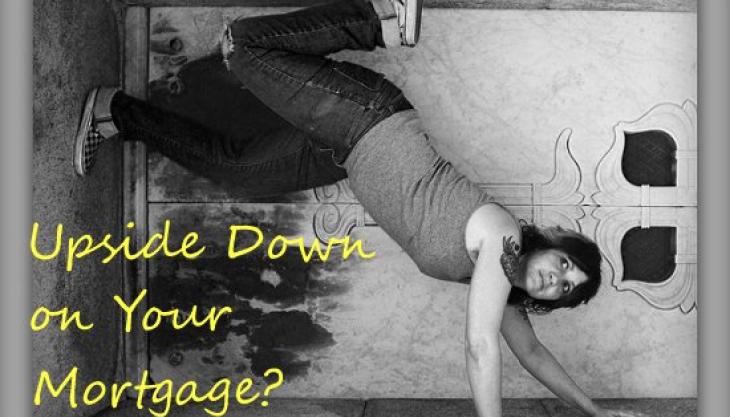5 Options if You’re Upside Down on Your Mortgage – North Carolina Bankruptcy Tips
Submitted by Rachel R on Fri, 11/06/2015 - 10:11am

There are options if your mortgage exceeds your home's value
Image Source: Flickr User Tony Fischer
Finances can be complicated if you’re living in a home with no equity. But what’s worse is a home where you’ve got negative equity – this means you owe more than the home is worth. This is also known as being “upside down” on your mortgage. This can happen a number of ways. Maybe you bought the house at a decent price but then the market tanked so your value fell below your mortgage balance. Or perhaps you took out a home equity line of credit that ate up your equity then the market shifted. No matter how you got there, knowing your house is more of a liability than an asset can be upsetting. Here’s five things to consider if you’re upside down on your mortgage and how North Carolina bankruptcy may be part of the solution.
#1 Ride it out
So long as you can afford your house payments, you can wait it out. Eventually, the market should reverse and your home value will increase so that it outweighs your mortgage balance. If you keep on making payments until the loan is paid off, you’ll also defeat this circumstance. It’s important that you keep your property up to par during this time. If you let your home fall into disrepair, you can wreck the equity you could otherwise be establishing.
#2 Short sale
A short sale refers to selling the home for a price short of the mortgage balance. You must have the lender’s permission to do this, but if they know you can’t afford the payments and the home will go into foreclosure otherwise, they may agree to it. In some cases, the lender may forgive the remaining balance and then you’ll be clear of the home. In other cases, the lender may convert the shortfall to an unsecured loan they want you to pay. Filing bankruptcy after the short sale will wipe out this debt.
#3 Rent the home (and ride it out)
Even if you can’t afford the payments, you may still be able to keep the home and ride out the wave until your equity goes positive by renting. If you can rent out the home for enough to cover the mortgage payments then rent or buy another place to live, you may be able to ride out market fluctuation until your home’s value increases enough that you can sell it, keep on renting or later move back into it. However, if you lose a renter, you can be in a tight spot. But if you keep up the home, this could be a workable plan.
#4 Refinance the mortgage
You may be able to refinance with a new lender, with your existing lender, or renegotiate the mortgage. For instance, if you have an ARM (adjustable rate mortgage) that has increased such that your payments aren’t affordable, the lender may drop your rates or convert your loan to a fixed interest rate. The lender does not want to deal with a foreclosure so depending on the market, they may work with you to keep you in the home. Alternately, you can apply for a new loan with another lender.
#5 Surrender the home (and file bankruptcy)
In North Carolina, if you surrender your home – which means you tell the lender you want to walk away or stop making payments and allow the lender to foreclose – you may face a deficiency judgment. This is when the home sells at foreclosure for less than the mortgage balance. The lender can try and pursue you for the difference. However, if the market rebounds by the time of the foreclosure such that the fair market value of the home equals the mortgage balance, you may be able to have the debt voided. Filing bankruptcy after the foreclosure can wipe out this debt as well as other unsecured debts.
To find out more about dealing with an upside down mortgage in NC, contact the Law Offices of John T. Orcutt. We can show you how a North Carolina bankruptcy can get you clear of a house you can’t afford, deal with a mortgage deficiency after foreclosure, or stop foreclosure in its tracks so you can keep your home. Call +1-833-627-0115 for a free North Carolina bankruptcy consultation at one of our offices in Raleigh, Durham, Fayetteville, Wilson, Greensboro or Wilmington.
Debts Hurt! Got debt? Need help? Get started below!
Serving All of North Carolina
- Bankruptcy Attorneys Raleigh NC (North)
- Bankruptcy Attorney Fayetteville NC
- Bankruptcy Attorney Durham NC
- Bankruptcy Attorneys Wilson NC
- Bankruptcy Attorneys Greensboro NC
- Bankruptcy Attorneys Southport NC
- Bankruptcy Attorneys Wilmington NC
Bankruptcy Attorneys Raleigh NC (North)
6616 Six Forks Rd #203 Raleigh, NC 27615 North Carolina
Tel: (919) 847-9750

Bankruptcy Attorney Fayetteville NC
2711 Breezewood Ave Fayetteville, NC 28303 North Carolina
Tel: (910) 323-2972

Bankruptcy Attorney Durham NC
1738 Hillandale Rd Suite D Durham, NC 27705 North Carolina
Tel: (919) 286-1695


Bankruptcy Attorneys Greensboro NC
2100 W Cornwallis Dr. STE O Greensboro, NC 27408 North Carolina
Tel: (336) 542-5993

Bankruptcy Attorneys Southport NC
116 N Howe St. Suite A Southport, NC 28461 North Carolina
Tel: (910) 218-8682

Bankruptcy Attorneys Wilmington NC
116 N. Howe Street, Suite A Southport, NC 28461 North Carolina
Tel: (910) 447-2987
